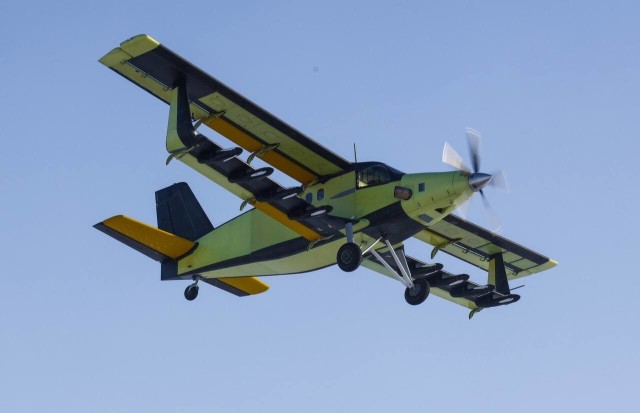The flight lasted 20 minutes at an altitude of 200 m at speeds from 50 km/h to 200 km/h
MOSCOW, February 16. /tass/. The heavy transport unmanned aerial vehicle of ultrashort takeoff and landing Partizan has completed the first stage of flight tests. This was announced to TASS by Grigory Makeich, project manager of the Foundation for Advanced Studies (FPI).
"On February 16, the developers of the Siberian Scientific Research Institute of Aviation named after S. A. Chaplygin conducted the first flight tests of the demonstrator of the ultra-short takeoff and landing unmanned aerial vehicle Partizan, which is being developed by order of the Advanced Research Foundation," said the project manager. The flight lasted 20 minutes at an altitude of 200 m at speeds from 50 to 200 km/h.
According to Makeich, the first flight of the Partizan was carried out in manned mode to ensure safety and take flight data for subsequent training of the automatic control system worked out on a semi-natural stand. "The first flight confirmed a significant increase in take-off and landing characteristics compared to aircraft of this class. The placement of an active blowing system on the aircraft along the entire span of the lower wing will allow the Partizan to significantly reduce the take-off and landing distance and ensure stable control at ultra-low speeds up to 50 km / h," the specialist added.
Andrey Grigoriev, Director General of the FPI, stressed that as a result of the work, a universal aircraft with the possibility of optional piloting will be created. "Thanks to the presence of an automatic control system, both fully autonomous cargo transportation in offline mode and passenger transportation in manned mode can be organized. The automatic control system will greatly simplify piloting an aircraft, which, together with a significant reduction in requirements for take-off and landing sites, in the future can make domestic aviation truly affordable, and Partizan is in demand from a large number of operators in various fields of application," he said.
Director of SibNIA, Honored Test Pilot of the Russian Federation Vladimir Barsuk noted that Partizan is a demonstrator of domestic technologies, which were worked on by the best teams of scientific aviation enterprises and institutes. "The device is made of completely domestic raw materials and components, with the exception of the main propulsion system. The domestic hybrid power plant for the Partizan project is under development, the main elements of which have already been manufactured and are undergoing bench tests," he said.
In the future, it is planned to create a research and production center in the Novosibirsk region on the basis of the Berdsk-Tsentralny airfield. "Today we have signed a cooperation agreement between the Foundation for Advanced Research, the BAS consortium and SibNIA, which will contribute to the organization and development of an air transport network based on promising off-airfield aviation and unmanned aircraft systems. Together with the government of the Novosibirsk Region, we are working on planning the creation of a research and production center for unmanned aircraft systems at the Berdsk-Tsentralny airfield," Badger explained.
About the Partizan transport drone
The unmanned aerial vehicle is designed to transport goods weighing up to 1,000 kg over distances of up to 1,000 km. The device is capable of taking off and landing on unprepared sites with dimensions of 50 by 50 m in both manned and unmanned mode.
The drone can be used in various fields: for cargo and passenger transportation; in rescue operations and fire extinguishing; when performing aviation chemical works and works in the interests of sanitary aviation; for air monitoring.

